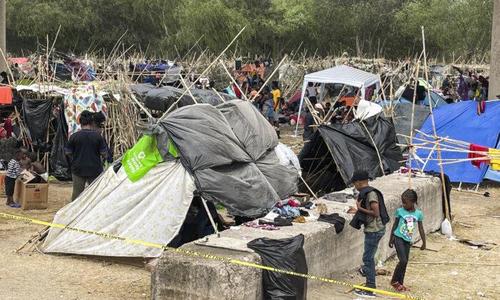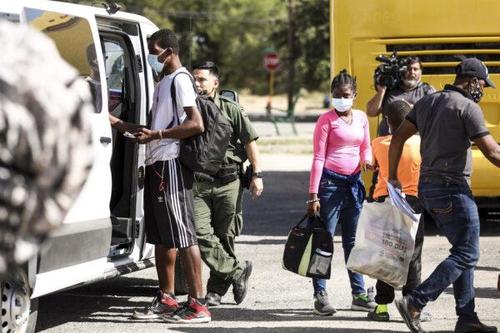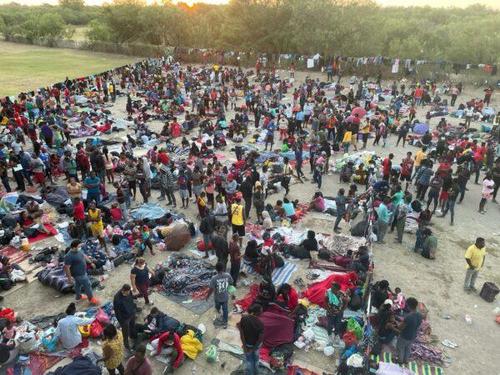Haitians Sue Biden Admin Over "Racist Treatment" In Del Rio Border Encampment
Authored by Charlotte Cuthbertson via The Epoch Times,
Several Haitians who crossed into the United States illegally are suing the Biden administration over “racist treatment” of the approximately 15,000 Haitians who gathered in a primitive encampment in Del Rio, Texas, in September.
The Haitian Bridge Alliance, a nonprofit based in California, joined 11 Haitians in filing the suit on Dec. 20, the group announced on Twitter.
The lawsuit alleges the Biden administration mistreated the Haitians with “calculated indifference.”
“They were denied food, water, and medical care. They were physically and verbally abused. And they were summarily expelled without an opportunity to request asylum and without consideration of the danger they would face in Haiti or Mexico,” the lawsuit charges.
The Department of Homeland Security (DHS) didn’t respond to requests for comment by The Epoch Times.
The lawsuit alleges that the Biden administration has been using the Title 42 health directive against Haitians and other illegal immigrants.
Title 42 was put in place in March 2020 to help curb the COVID-19 pandemic by stopping nonessential border travel.
“Consistent with the United States’ long history of anti-Haitian and anti-Black immigration policies, the Biden administration has used the Title 42 process as a cudgel to deny thousands of Haitians an opportunity to access the U.S. asylum process,” the lawsuit states.
Thousands of illegal immigrants, primarily Haitian nationals, started streaming across the Rio Grande—which divides Texas and Mexico—and gathering under an international bridge in Del Rio, Texas, in early September.
The conditions quickly became crowded and squalid as law enforcement struggled to handle the overwhelming influx.
At its height, the area held around 15,000 mostly Haitian illegal immigrants who were waiting to be processed by Border Patrol and were walking back and forth across the river to Mexico for supplies.
Illegal immigrants take supplies back and forth between Acuña, Mexico, and the United States (far side) across the Rio Grande, the international boundary with Mexico, in Acuña, Mexico, on Sept. 20, 2021. (Charlotte Cuthbertson/The Epoch Times)
All of the Haitians that The Epoch Times spoke to at the time had been living in Chile or Brazil for years before deciding to come to the United States.
They all said it wasn’t an option for them to return to Haiti and that they were determined to get into the United States one way or another.
Many had destroyed their visas and documentation from other resident countries before they crossed into the United States, as evidenced by the discarded identification documents on the Mexican side of the river. Some said they believed it would be more difficult to deport them if they discarded their papers.
The camp was cleared by Sept. 24, with the majority of the Haitians being released into the United States to await a future court date. None were tested for COVID-19.
DHS Secretary Alejandro Mayorkas said on Sept. 24 that approximately 2,000 Haitians had been deported to Haiti on 17 repatriation flights.
Mayorkas said that since Sept. 9, when the Haitian crisis began to escalate, Border Patrol had encountered nearly 30,000 illegal immigrants in Del Rio.
Of those, approximately 12,400 were released with a court date or a notice to check in at a federal immigration office within 60 days.
Some 8,000 returned to Mexico voluntarily. Another 5,000 were being processed to determine whether they should be expelled or let go with a notice.
Border Patrol drops van loads of Haitians who crossed the U.S. border illegally at local NGO Border Humanitarian Coalition to catch a bus to San Antonio or Houston, in Del Rio, Texas, on Sept. 22, 2021. (Charlotte Cuthbertson/The Epoch Times)
The lawsuit alleges that at least 99 expulsion flights to Haiti carrying more than 10,000 asylum seekers have occurred since mid-September. Customs and Border Protection didn’t respond to a request to confirm those numbers.
One Haitian couple highlighted in the lawsuit said they came to the United States with their 1-year-old after living in Chile for several years.
“They never received an opportunity to seek asylum or explain why they feared returning to Haiti,” the lawsuit states. The couple also allege they were shackled while being transported back to Haiti.
DHS began to restrain illegal immigrants bound for deportation while transporting them after a group of Haitians overtook a bus and tried to flee.
On Sept. 20, when a busload of Haitians realized they were going to be deported, they started fighting with Border Patrol agents, forced the bus to stop, and fled.
Texas Department of Public Safety (DPS) officers responded to the scene and eventually detained all the individuals.
“When the migrants found out they were going to be sent back to Haiti, they took the bus over and they fled,” said Brandon Judd, president of the National Border Patrol Council, at a press conference in Del Rio on Sept. 22.
“If it wasn’t for the men and women in uniform, DPS, we do not know what would have happened.”
The Haitian couple in the lawsuit was returned to Haiti, and the mother and child have since traveled to Chile, while the father remains in Haiti, according to the lawsuit. “They plan to return to the United States to seek asylum,” it states.
Thousands of illegal immigrants, mostly Haitians, live in a primitive, makeshift camp under the international bridge that spans the Rio Grande between the U.S. and Mexico while waiting to be detained and processed by Border Patrol, in Del Rio, Texas, on Sept. 21, 2021. (Charlotte Cuthbertson/The Epoch Times)
The lawsuit highlights also the Border Patrol horse patrol unit that sparked furor after several photographs and video footage showed agents grabbing people who illegally crossed from Mexico.
White House officials decried the images and promised an investigation, while other critics claimed that Border Patrol agents were “whipping” the Haitians with their reins, which Border Patrol said is a technique to keep people from being trampled by the horse.
The inspector general for the DHS subsequently refused to take up the investigation.
The lawsuit charges senior White House and Homeland Security officials with developing a “Haitian deterrence policy,” which was “deliberately indifferent to humanitarian concerns, and focused on expelling Haitian asylum seekers as quickly as possible.”
On a policy level, the Biden administration has been lenient on illegal immigrants, including through policy changes that allow most to be released into the United States.
Mayorkas announced on May 22 an extension for Haitians currently eligible under the temporary protected status (TPS) program that was put in place after the 2010 earthquake.
That allowed Haitians who were already in the United States before the earthquake to stay, as their country was deemed unsafe to return to. TPS holders get work permits and are shielded from deportation.
The original 2010 designation for Haitians was extended several times until the Trump administration announced in January 2018 that it would end effective July 22, 2019. Subsequent lawsuits allowed the designation to remain in effect.
On Aug. 3, Mayorkas dramatically increased the number of Haitians eligible for the program by announcing that all Haitians who had made it into the United States by July 29 this year would now be eligible to apply for TPS.
Thousands of illegal immigrants amass in Del Rio, Texas, on Sept. 16, 2021. (Charlotte Cuthbertson/The Epoch Times)
It’s difficult to know whether Haitians who have gained residency in another country, such as Chile or Brazil, are eligible for asylum in the United States.
Asylum-seekers need to prove that they have suffered past persecution or have a well-founded fear of future persecution in their home country because of their race, religion, nationality, political opinion, or membership in a particular social group.
But persecution is generally considered state-sanctioned or condoned, which means the government of the alien’s home country is the sponsor of the persecution. For example, in North Korea, the regime itself persecutes Christians.
Most claims of asylum in the United States are ultimately rejected, including roughly 90 percent of claims from Central Americans.
A backlog of more than 1.3 million cases, with approximately 610,000 pending asylum applications, is being handled by a corps of immigration judges that numbered 539 as of April. Most asylum-seekers must wait years before their claims are adjudicated.
The lawsuit is seeking an end to the use of Title 42 and the “Haitian deterrence policy” for the defendants and Haitian nationals in general.
It’s also asking for the deported Haitians to be brought back to the United States to pursue asylum claims, as well as “further relief as the court deems just, equitable, and proper.”
https://ift.tt/3FCdElm
from ZeroHedge News https://ift.tt/3FCdElm
via IFTTT









0 comments
Post a Comment